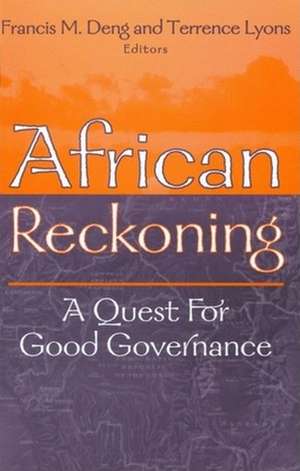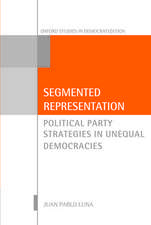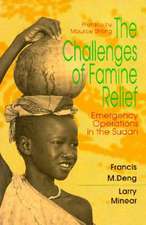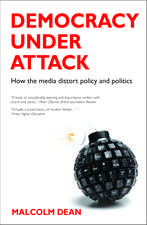African Reckoning: A Quest for Good Governance
Editat de Francis M. Deng, Terrence Lyonsen Limba Engleză Paperback – sep 1998
This book investigates how changing norms of sovereignty may promote better governance in Africa. It begins by tracing the evolution of the concept of sovereignty and how, in the post-Cold War era, sovereignty has been redefined to emphasize the responsibility of the state to manage conflict and protect human rights. African Reckoning includes assessments of how state actors in Africa measure up to the norms inherent in the notion of sovereignty as responsibility. The book also examines the question of accountability at the regional and international levels.
The authors conclude that since the power of oppressed people to hold their governments accountable is very limited, the international community has a responsibility to provide victims of internal conflict and gross violations of human rights with essential protection and assistance. Accordingly, the book expounds on the normative principles of responsible sovereignty, international mechanisms and strategies for their enforcement, and empirical evidence about the performance of governments as measured by the requirements of responsible sovereignty. Contributors include Richard Falk, Abdullahi Ahmed An-Na'im, James Rosenau, Goran Hyden, Michael Chege, and John D. Steinbruner.
The authors conclude that since the power of oppressed people to hold their governments accountable is very limited, the international community has a responsibility to provide victims of internal conflict and gross violations of human rights with essential protection and assistance. Accordingly, the book expounds on the normative principles of responsible sovereignty, international mechanisms and strategies for their enforcement, and empirical evidence about the performance of governments as measured by the requirements of responsible sovereignty. Contributors include Richard Falk, Abdullahi Ahmed An-Na'im, James Rosenau, Goran Hyden, Michael Chege, and John D. Steinbruner.
Preț: 196.21 lei
Nou
Puncte Express: 294
Preț estimativ în valută:
37.55€ • 40.15$ • 31.30£
37.55€ • 40.15$ • 31.30£
Carte tipărită la comandă
Livrare economică 18 aprilie-02 mai
Preluare comenzi: 021 569.72.76
Specificații
ISBN-13: 9780815717836
ISBN-10: 0815717830
Pagini: 300
Ilustrații: Illustrations
Dimensiuni: 152 x 229 x 14 mm
Greutate: 0.28 kg
Ediția:New.
Editura: Brookings Institution Press
Colecția Brookings Institution Press
Locul publicării:United States
ISBN-10: 0815717830
Pagini: 300
Ilustrații: Illustrations
Dimensiuni: 152 x 229 x 14 mm
Greutate: 0.28 kg
Ediția:New.
Editura: Brookings Institution Press
Colecția Brookings Institution Press
Locul publicării:United States
Notă biografică
Francis M. Deng is a nonresident senior fellow in the Foreign Policy Studies program at the Brookings Institution and co-director of the Brookings-SAIS Project on Internal Displacement. He has served as the Sudan's minister of state and foreign affairs; as its ambassador to Canada, the United States, and Scandinavia; and as special representative of the United Nations secretary-general for internally displaced persons. Terrence Lyons is an associate professor of conflict resolution at the Institute for Conflict Analysis and Resolution and interim director of the Center for Global Studies at George Mason University.This report is sponsored by the Council's Center for Preventive Action.
Descriere
This book investigates how changing norms of sovereignty may promote better governance in Africa. It begins by tracing the evolution of the concept of sovereignty and how, in the post-Cold War era, sovereignty has been redefined to emphasize the responsibility of the state to manage conflict and protect human rights. African Reckoning includes assessments of how state actors in Africa measure up to the norms inherent in the notion of sovereignty as responsibility. The book also examines the question of accountability at the regional and international levels.
The authors conclude that since the power of oppressed people to hold their governments accountable is very limited, the international community has a responsibility to provide victims of internal conflict and gross violations of human rights with essential protection and assistance. Accordingly, the book expounds on the normative principles of responsible sovereignty, international mechanisms and strategies for their enforcement, and empirical evidence about the performance of governments as measured by the requirements of responsible sovereignty. Contributors include Richard Falk, Abdullahi Ahmed An-Na'im, James Rosenau, Goran Hyden, Michael Chege, and John D. Steinbruner.
The authors conclude that since the power of oppressed people to hold their governments accountable is very limited, the international community has a responsibility to provide victims of internal conflict and gross violations of human rights with essential protection and assistance. Accordingly, the book expounds on the normative principles of responsible sovereignty, international mechanisms and strategies for their enforcement, and empirical evidence about the performance of governments as measured by the requirements of responsible sovereignty. Contributors include Richard Falk, Abdullahi Ahmed An-Na'im, James Rosenau, Goran Hyden, Michael Chege, and John D. Steinbruner.




















